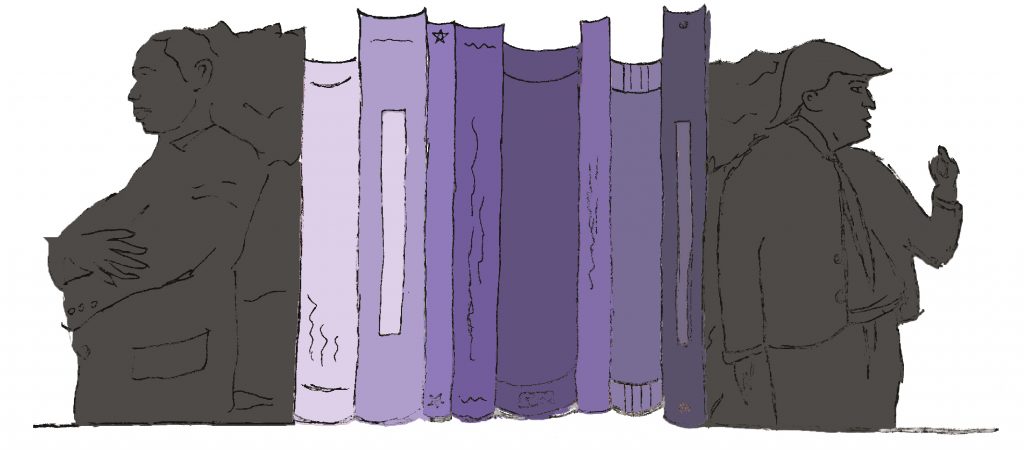Last week, we at Georgetown celebrated—insofar as cancelling classes on Monday and Friday serves as a barometer for celebration—a juxtaposition of historical forces personified in two men. This is a reality of the stagnation, perhaps even regression, of racial politics in this country.
The symbolism of this celebratory nexus—Martin Luther King Jr.’s remarkable contribution to American justice on MLK Day and Donald Trump’s breathtaking election to the highest office in American politics on Inauguration Day—cannot be understated. Even within the narrower realm of racial discourse, the tonal dissonance between King’s message of love and Trump’s rhetoric toward Muslim-Americans and Mexican immigrants is hard to ignore.
But, more pointedly, the differences in the work of the two men, of their actions, and of their characters point to something more troubling.

Illustration by Elizabeth Pankova and Aicha Nzie. Elizabeth Pankova and Aicha NzieIllustration by Elizabeth Pankova and Aicha Nzie.
As reported earlier this year by The New York Times, the management arm of Trump’s real estate company (Trump Management) racially discriminated against African Americans ubiquitously and at almost every stage of the transactional process. A mere seven African American families occupied the more than 3,700 apartments in Trump Village. Irving Wolper, a Trump Management agent responsible for selling apartments to potential tenants and who Trump described as “a fabulous man,” “an amazing manager,” and “a classic,” referred to a federal investigator, Maggie Durham, as a “n****r lover.”
In Norfolk too, where Trump’s father built complexes his son would later manage, complaints of racial discrimination emerged: “a former Trump [Management] superintendent named Thomas Miranda testified that multiple Trump Management employees had instructed him to attach a separate piece of paper with a big letter ‘C’ on it—for ‘colored’—to any application filed by a black apartment-seeker,” as reported by The New York Times.
Even after Trump and Trump Management signed a consent agreement in 1978 that stipulated an immediate abandonment of discriminatory practices, the federal government charged Trump Management with breaking the agreement. By 1982, the case had fizzled out and Trump launched the construction not only of the prized Trump Tower, but of a new Trump brand. Clearly, then, Trump and his family’s success was predicated on practices that, put simply, sought to increase the economic and social well-being of one racial group at the direct cost of another.
Most recently, Trump’s comments about Georgia Rep. and civil rights’ icon John Lewis point to something similarly troubling, at least rhetorically. Trump tweeted that Rep. Lewis should “spend more time fixing and helping his district, which is in horrible shape and falling apart (not to mention crime infested)” and “finally focus on the bruning and crime infested inner-cities of the U.S.” For Trump to flippantly dismiss the work and character of a man who, just as one example, sacrificed his physical well-being during the 1965 march across the Edmund Pettus Bridge is disgraceful, but unsurprising.
By contrast, King’s work in the period directly preceding Trump’s ascent culminated in the passage of the Civil Rights Act of 1964 and the 1965 Voting Rights Act. Many credit King too with momentum that led to the creation of the Fair Housing Act of 1968, which passed in the same year of King’s death and solidified legal mechanisms through which the federal government could punish unequal access to housing opportunity on the basis of race, sexual orientation, religious affiliation, familial status, or national origin.
Even 47 years later, on July 16, 2015, many saw the Affirmatively Furthering Fair Housing (AFFH) rule, implemented by President Obama’s Department of Housing and Urban Development (HUD), as a continuation and strengthening of King’s legacy. The rule requires HUD funds-receiving cities and municipalities to look for, assess, and measure instances of racial discrimination in their housing practices and subsequently propose locally driven policy solutions to any such discrimination.
As I’ve thought about the celebration of King’s life and work a mere four days before the celebration and solidification of Trump’s swift ascent to political zenith, four days before the end of our first black President’s tenure, I’ve been struck by the historical symbolism at work.
If one accepts the widely researched and accepted notion that housing, whether ownership or rental, not only determines and is determined by the accumulation of wealth, but also acts as a gateway to employment, education, healthcare, and social benefits access, Trump represents the very nature of institutionalized white supremacy. A scion of opulent, unearned inheritance, Trump and his company obtained their success by maiming access to housing—to opportunity and equality—for black America. Trump built his success on the repudiation of King’s work.
After the week of King’s Monday and Trump’s Friday, I wonder just how far this country has really come since King’s death. Perhaps our current moral arc—the moral arc of this America, of this moment, and of this universe—shows a bend not toward justice, but toward something much darker indeed.
Isaiah is a sophomore in the SFS.





